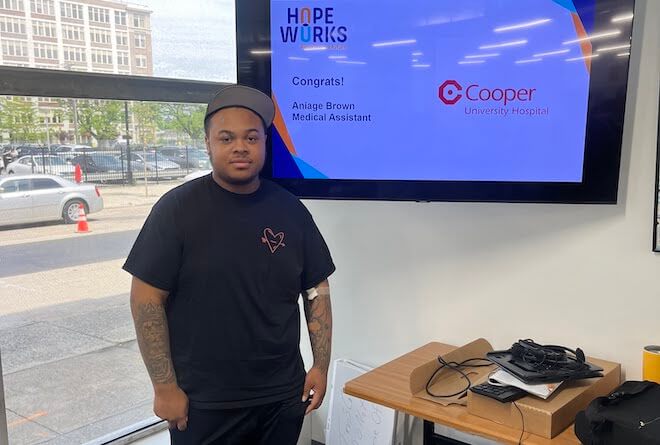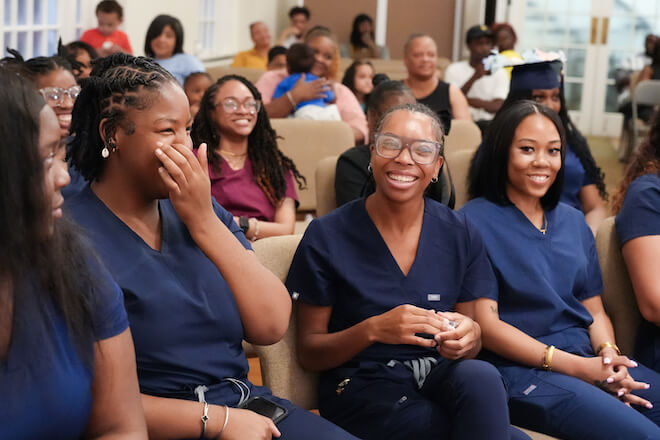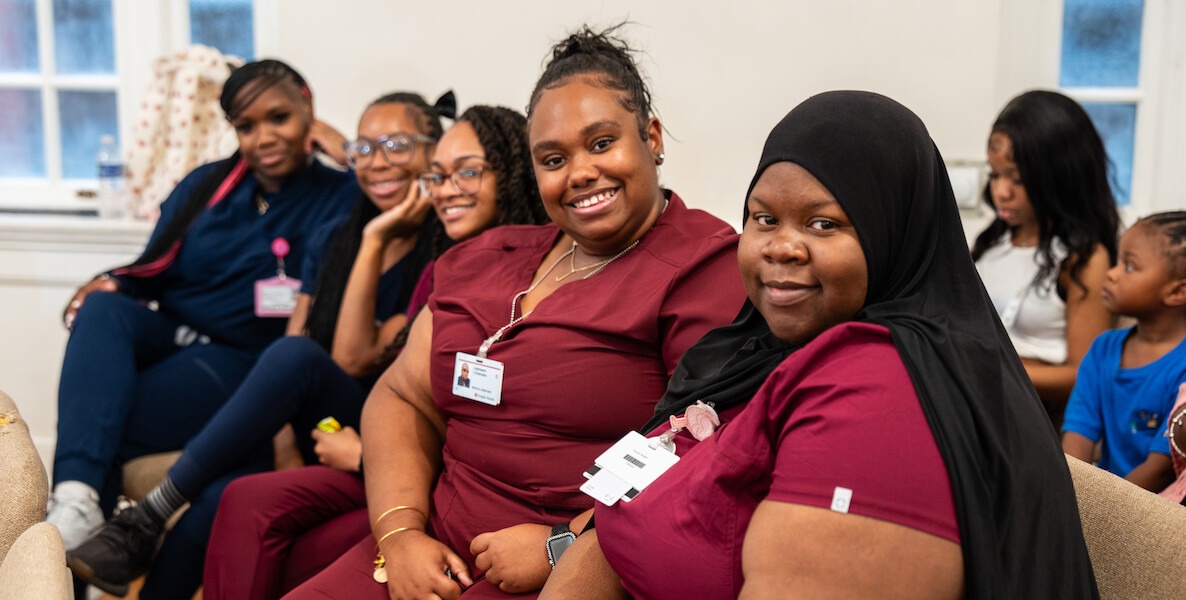As a kid growing up in North Philadelphia, Aniage Brown always dreamed of a career where he could help people. “I wanted to be a firefighter,” says Brown, now 26. “But telling that to your parents in Philadelphia? It definitely freaks them out.”
Brown graduated from One Bright Ray Community High School, then found himself in a series of dead-end jobs at companies like Burlington Coat Factory and Amazon. Every day, he’d wake up wanting to call in sick. “I reached a point when I was 21 where I realized that I couldn’t keep doing jobs like this for the rest of my life,” he says.
That’s when his brother encouraged him to go to Hopeworks, the Camden-based nonprofit that trains folks for careers in fields with a demand for employees, and then matches them with jobs. The organization, which is celebrating 25 years in 2025 and recently opened a new, 4,000-square foot facility in Kensington, first put itself on the regional workforce development map with tech programs, offering training in 21st-century skills like website development, drone services and more.

Brown went through Hopeworks’ training program — which focuses just as much on soft skills in the workplace, like professionalism and how to take feedback — and got a job at Benefits Data Trust, the now-defunct organization that helped seniors navigate and apply for benefits. He worked there for a year, then heard about another program Hopeworks was offering: training to become a medical assistant.
See, Hopeworks, like any successful organization, is nimble. “As tech hiring has slowed, the need for young adults to live their lives or get transformational jobs hasn’t,” Dan Rhoton, Hopeworks’ executive director, says. “So we’ve been able to pivot into areas where, yes, tech is helpful, but where there’s also a huge demand.”
For Hopeworks, that looked like readying employees for jobs in the ever-growing healthcare sector. McKinsey, for example, projects that healthcare profit will grow from $583 billion in 2022 to $819 billion in 2027. Rhoton says that, nationally, the Bureau of Labor Statistics projects that “the medical assisting field will grow by 19 percent over the next 10 years.” Recognizing this, last year Hopeworks rolled out a pilot program to train 25 people to become Medical Assistants, phlebotomists, EMT-trained professionals — careers at the entry point on the healthcare ladder that pave the way for advancement. Starting salaries in these roles come in at about $42,000.
“We’ve worked hard to make sure that that initial job is a pathway into wealth, not just a way of being broke with a better car,” Rhoton says. “Making $42,000 is still not a ton of money, so we have to make sure you’re using that money to buy a house, to invest in your kids, to get a promotion.”
“As tech hiring has slowed, the need for young adults to live their lives or get transformational jobs hasn’t.” — Dan Rhoton, Hopeworks
To that end, Hopeworks provides its alumni with ongoing support during their first year, giving them investment advice, home buying advice, and mentorship. “We know that our young adults are often the first in their families or social circle to get into these professional, higher-wage jobs,” Rhoton says. The majority of Hopeworks participants are from oft-marginalized backgrounds: 54 percent identify as Black or African American, 34 percent are Hispanic or Latino. “It’s a lonely place if you let it be. And we’re not gonna let it be.” Rhoton believes this post-program support explains the program’s high job placement retention rate: 93 percent of alumni are still in their role after 12 months.
One of several opportunities in Philly
Brown found all of these numbers appealing. He joined the pilot cohort in a 10-week Medical Assistant training program — Hopeworks covered the cost of training, which would otherwise cost about $2,700, and paid him a stipend of $30 a day. “I never could have pursued this path had I been expected to pay for training,” Brown says.
Held at American Training Center in Pennsauken, each day was split in two: mornings in the classroom, afternoons spent doing hands-on training, like learning to draw blood and take patients’ blood pressure. After 10 weeks, Brown earned both a Medical Assistant certificate and a phlebotomy certificate. Even better, Cooper University Healthcare offered him a three-month paid apprenticeship.
“There’s a lot of satisfaction knowing I’m in a field that not only offers me financial stability, but also lets me help people, as I always wanted to do.” — Aniage Brown, MD Anderson Cancer Center at Cooper
Then, in May, Brown became a full-time employee of MD Anderson Cancer Center at Cooper. Better still, once Brown hits his one-year work anniversary, Cooper will cover the cost of continuing education; Brown plans to apply for a two-year program at Rowan University to become a radiology technician.
In November, Hopeworks received a $660,000 grant from the Haines Family Foundation to train and place another 68 young adults in medical positions, generating an estimated $1.8 million in additional community wages. Rhoton hopes to continue to scale the program beyond that, training more people, partnering with more health systems, expanding this pathway to the middle class.

Hopeworks’ model is just one of a handful of programs in the region focusing on developing a workforce for the multi-billion-dollar healthcare industry. In September, Children’s Hospital of Philadelphia (CHOP) announced that it had received a $19.6 million grant from Bloomberg Philanthropies to support a partnership between CHOP and Mastery Hardy Williams High School in Southwest Philly. According to the CHOP announcement, the high school “will become a healthcare career school, and CHOP will welcome as many as 100 qualified high school graduates per year — students it has trained — into jobs with family-sustaining salaries.”
Last March, the City of Philadelphia announced a $1.15 million investment in “Organizations Advancing Innovative Workforce Training Programs,” like Propel America, which received $250,000 to support training for Philadelphians to become medical assistants as well. In 2023, the program — a 48-week, online model — welcomed a cohort of 103 people; in 2024, that number jumped to 166. As with Hopeworks’ program, the average starting salary for Propel-trained grads is just over $40,000, and participants receive a stipend and free tuition (which would otherwise cost $10,000 with Propel).
Brown is grateful for the experience — the financial stability, the example he’s setting for his three-year-old son, the insight he now has, for example, when he visits a doctor or takes his child to one. He looks forward to work now, he enjoys the company of his colleagues. And, he says, “There’s a lot of satisfaction knowing I’m in a field that not only offers me financial stability, but also lets me help people, as I always wanted to do.”
No firehose required.
 Every Voice, Every Vote funds Philadelphia media and community organizations to expand access to civic news and information. The coalition is led by The Lenfest Institute for Journalism. Lead support for Every Voice, Every Vote in 2024 and 2025 is provided by the William Penn Foundation with additional funding from The Lenfest Institute for Journalism, Comcast NBC Universal, The John S. and James L. Knight Foundation, Henry L. Kimelman Family Foundation, Judy and Peter Leone, Arctos Foundation, Wyncote Foundation, 25th Century Foundation, and Dolfinger-McMahon Foundation.
Every Voice, Every Vote funds Philadelphia media and community organizations to expand access to civic news and information. The coalition is led by The Lenfest Institute for Journalism. Lead support for Every Voice, Every Vote in 2024 and 2025 is provided by the William Penn Foundation with additional funding from The Lenfest Institute for Journalism, Comcast NBC Universal, The John S. and James L. Knight Foundation, Henry L. Kimelman Family Foundation, Judy and Peter Leone, Arctos Foundation, Wyncote Foundation, 25th Century Foundation, and Dolfinger-McMahon Foundation.
![]() MORE ON WORKFORCE DEVELOPMENT IN PHILLY
MORE ON WORKFORCE DEVELOPMENT IN PHILLY





